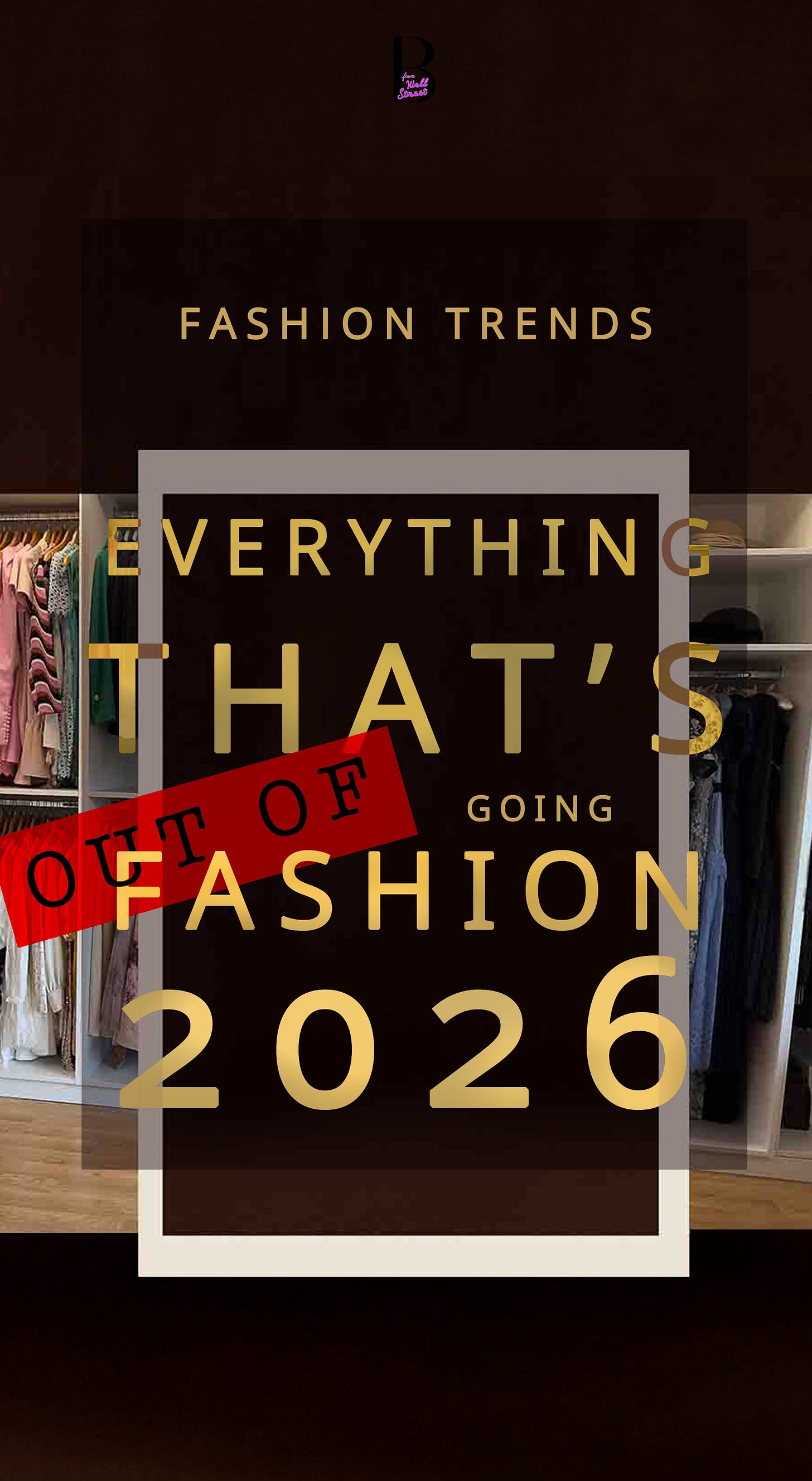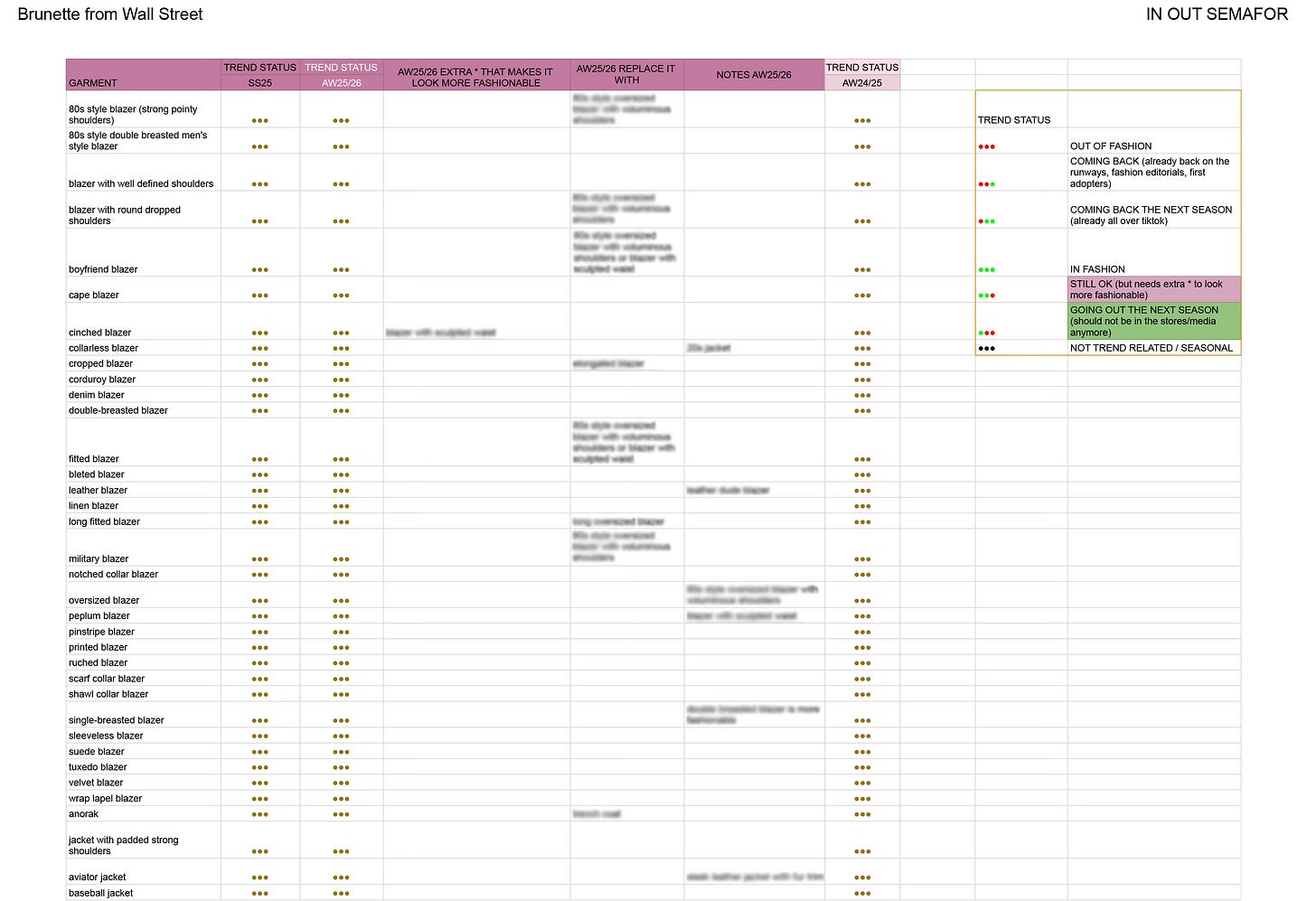These Clothes Are Out of Fashion for AW25/26
See Where in the Trend Life Cycle Are Currently Popular Clothes, Shoes, Bags and Accessories
The fashion industry thrives on constant evolution. New trends emerge, capturing the zeitgeist and influencing consumer desires. However, this dynamism also means styles inevitably fade, sometimes experiencing snap returns and other times becoming relics of an era. It is important to understand the complexities of this dynamic. This is why we go beyond simply declaring "what's out." Instead, we offer fashion insiders – stylists, designers, content creators, and influencers – a strategic perspective on navigating this ever-evolving landscape.
To empower informed decision-making, we present you a table outlining 965 items, ranging from blazers, jackets, coats, pants, shorts, skirts, dresses, tops, blouses, shirts, knitwear, dresses, lingerie, swimwear, socks, hair accessories, hats, bags to shoes, and their current trend status for Fall/Winter 2024-2025. This breakdown goes beyond simply declaring an item "out" and delves into the nuances that can keep it relevant or suggests fashionable alternatives.
With this comprehensive resource at your fingertips, you'll know exactly what is in fashion now, what is going out and what is already outdated. Scroll down to see the table and explore the intricacies of what's in, what's out, and how to cultivate the best wardrobe yet.
Beyond "What's Out": Understanding the Drivers of Trend Decline
This analysis goes beyond surface pronouncements. We explore the "why" behind the decline of certain trends and identify the broader cultural shifts that influence consumer preferences. By understanding these factors, fashion professionals can make informed decisions and ensure their work remains relevant and appealing. Here are some key drivers of trend decline:
Saturation: Overexposure can lead to consumer fatigue. When a trend becomes ubiquitous, it loses its novelty and appeal. Remember the ubiquitous cutout dress, drop waist dress, cargo pants, and skinny jeans? While a timeless staple for some, its dominance for over a decade has undoubtedly contributed to a shift towards more diverse silhouettes.
Cultural Shifts: Fashion reflects the social and cultural climate. A trend that resonated with a specific zeitgeist may feel outdated as cultural priorities evolve. Take the rise of athleisure – it mirrored a growing focus on health and active lifestyles. However, as society grapples with work-life balance, the desire for comfort may translate into more elevated takes on casual wear.
The Desire for Newness: Consumers are constantly seeking fresh styles and experiences. Fashion's cyclical nature thrives on innovation and a constant evolution of trends. Today's "it" bag may be tomorrow's forgotten accessory, prompting a renewed interest in vintage finds or emerging designers pushing boundaries.
IN AND OUT OF FASHION 2025/26 TABLE
The table below provides trend status for Fall/Winter 2025/2026, Spring Summer 2025 and Fall/Winter 2024/2025. This analysis goes beyond a simple "in" or "out" designation. We explore what factors might contribute to a garment's continued relevance, even if it's generally considered out of fashion, and suggest potential replacements for those styles that have truly lost their appeal.
Remember, fashion trend cycles don’t follow a linear timeline. Instead of ticking away by the hour or moving predictably, they often loop, skip, or even reverse. And sometimes they stop moving and stay at the same place for a season or two.
*TABLE PREVIEW
Key to the Table:
Garment: This column lists 1109 garments ranging from blazers, jackets, coats, pants, shorts, skirts, dresses, tops, blouses, shirts, knitwear, dresses, lingerie, socks, swimwear, hats, hair accessories, bags and shoes.
Season: Subdivided into Spring Summer 2025 (SS25), Fall/Winter 2025/26 and Fall/Winter 2024/25 (AW24/25), indicating the trend status for each garment in the respective season.
Trend Status: This column provides a snapshot of the garment's current trend trajectory.
What Keeps it Fashionable: For fading or on-trend items, this column highlights specific elements (fabric, details, styling tips) that can elevate the piece and ensure it remains stylish.
Replace With: For declining trends, this column suggests stylish alternatives that align with current consumer preferences.
Utilizing this table, fashion buyers and fashion stylists can curate client wardrobes that are both flattering and relevant. Designers can refine their collections based on consumer desires. Content creators can use this information to develop engaging content that showcases on-trend and timeless pieces.
This table is for our founding members only. *You might need to upgrade your subscription to see the table.






